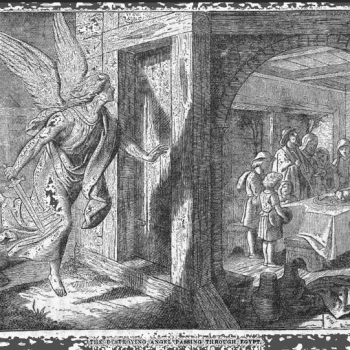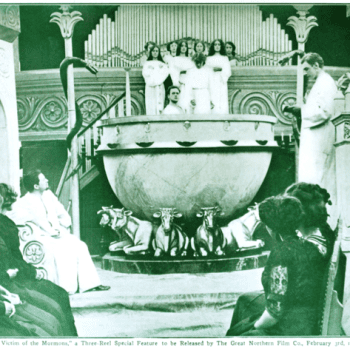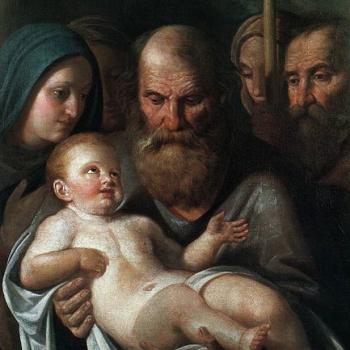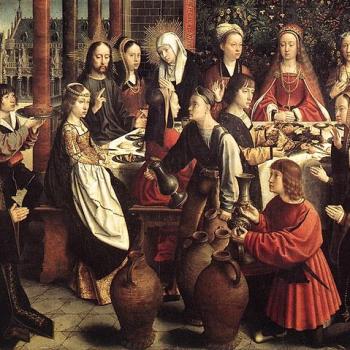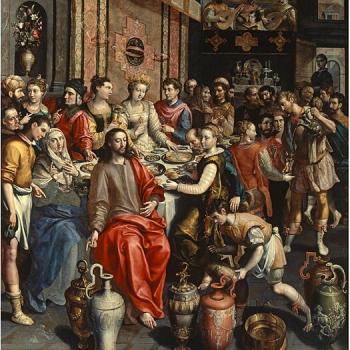
The Annunciation (1444), by Barthélemy d’Eyck (fl. 1444-1469) [public domain / Wikimedia Commons]
***
(8-31-06)
***
This is my own original draft for a chapter that was to appear in my book, The One-Minute Apologist (2007). It’s very different from the final draft, so that it amounts to an alternate approach to arguing the Catholic position.
*****
How can someone be greater or older than God? It makes no sense!
Initial Reply
*
The title “Mother of God” (Greek, Theotokos, or “God-bearer”) refers to the indisputable fact that Mary was the mother of Jesus, Who was God. Understood properly in this way, it shouldn’t be objectionable in the least.
*
Historic Catholics, Orthodox, and Protestants all believe that Jesus was God Incarnate: God in the flesh; the Second Person of the Holy Trinity. This title for Mary was specifically intended by the early Church to protect the deity or divinity of Jesus, since some were arguing that she was the mother of His human nature only. It would be odd to argue that human mothers give birth only to the bodies of their sons and daughters, rather than to a person who consists of body and soul. Human beings “co-create” in a sense the bodies of their children (implied by the word “procreate”), while they have nothing to do with their souls, which are directly created by God.
Likewise, Mary gave birth to Jesus as a human person, even though she had nothing to do with His divine nature (now merged with a human nature), which existed eternally. She gave birth to “the man Who was God,” so she is the mother of God (the Son). At no time have Catholics or Orthodox thought that Mary was “mother” of God the Father or the Holy Spirit. It is only from sheer misunderstanding that anything other than this was thought to be implied by “Mother of God.” Many notable Protestants have also used the title:
She became the Mother of God, in which work so many and such great good things are bestowed on her as pass man’s understanding. For on this there follows all honor, all blessedness, and her unique place in the whole of mankind, among which she has no equal, namely, that she had a child by the Father in heaven, and such a Child . . . Hence men have crowded all her glory into a single word, calling her the Mother of God . . . None can say of her nor announce to her greater things, even though he had as many tongues as the earth possesses flowers and blades of grass: the sky, stars; and the sea, grains of sand. It needs to be pondered in the heart what it means to be the Mother of God.
(Martin Luther, Commentary on the Magnificat, 1521; in Luther’s Works, Pelikan et al, volume 21, 326)
On account of this personal union and communion of the natures, Mary, the most blessed virgin, did not conceive a mere, ordinary human being, but a human being who is truly the Son of the most high God, as the angel testifies. He demonstrated his divine majesty even in his mother’s womb in that he was born of a virgin without violating her virginity. Therefore she is truly the mother of God and yet remained a virgin.
(Formula of Concord, from 1577: one of the Lutheran confessions, translated by Arthur C. Piepkorn: Solid Declaration, Article VIII: “The Person of Christ,” section 9)
The description of Mary as the “Mother of God” was and is sensible, permissible and necessary as an auxiliary Christological proposition.
(Karl Barth, Church Dogmatics, I, 2, Edinburgh: T. & T. Clark, 1963, 138)
*
But Catholics take it too far and regard Mary as more than the creature she is by calling her this title. What Catholics mean by it is different from what others mean, because it is in the context of all the excessive Marian doctrines, which exalt Mary far higher than the way she is presented in Scripture: as a humble handmaiden of the Lord.
*
This is an unfair accusation and absolutely untrue. It is impossible to find any official Catholic dogmatic document stating that Mary is the “mother of God the Father” or “mother of the Holy Spirit.” But to deny that Mary was the mother of God (the Son) would be to deny that Jesus was God. Catholics use the term in the first place to glorify Jesus! God the Father (not Catholics) chose to use Mary in the incarnation. Nor is it true that anything else Catholics believe about Mary changes their understanding of this description: agreed-upon by the vast majority of all Christians throughout history.
Heinrich Bullinger (1504-1575; prominent early Protestant leader and author of the Second Helvetic Confession):
What pre-eminence in the eyes of God the Virgin Mary had on account of her piety, her faith, her purity, her saintliness and all her virtues, so that she can hardly be compared with any of the other saints, but should by rights be rather elevated above all of them, appears very clearly in the first chapters of the gospels of St. Matthew and St. Luke, and particularly in her Magnificat . . . If Mary really is the Mother of the Lord, . . . then it is altogether just that she should be named by the Fathers of the Church theotokos, that is to say Mother of God. Nestorius denied that in the most infamous manner . . .
(in Max Thurian, Mary: Mother of all Christians, translated by Neville B. Cryer, New York: Herder & Herder, 1963, 197-198; 89; from Uber die Selige Jungfrau, May 18, 1558)
*****
Meta Description: Refutation of the notion that Catholics actually regard Mary as a higher being than God, by calling her the Mother of God [the Son].
Meta Keywords: deity of Christ, divinity of Christ, God-bearer, incarnation, Mother of God, Theotokos, virgin birth




